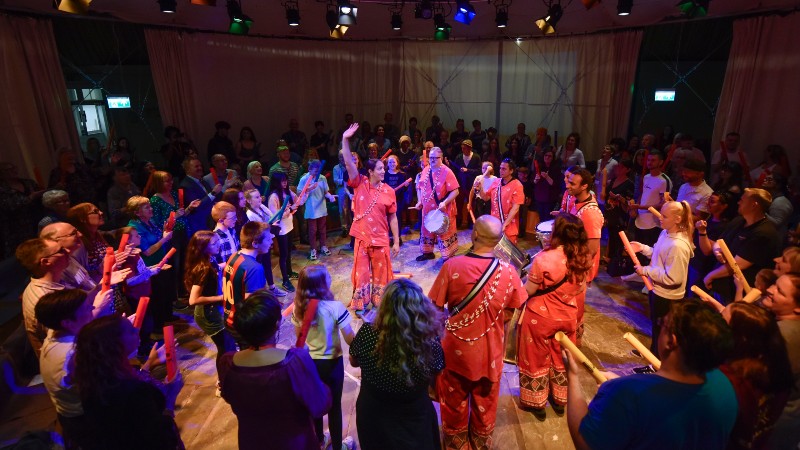Why back the arts?
Reproduced below is an article written by our Trust Manager, Louise Magill, for Arts Professional titled: ‘Why back the arts?’ Published on September 2nd, 2025, the original article can be found here.
This summer, the Oglesby Charitable Trust marked 20 years of the Bruntwood Prize for Playwriting – one of our most high-profile, philanthropic programmes. For those attending the awards ceremony at Manchester’s Royal Exchange Theatre, it was an opportunity to celebrate both the many playwrights whose careers have been impacted by the prize and the collaborative support framework that has made it possible.
Michael and Jean Oglesby, founders of the Oglesby Charitable Trust (OCT), were passionate about both the arts and their home city. Having supported the Royal Exchange since its inception, they were instrumental in founding the Bruntwood Prize to create opportunities for new voices in theatre that would resonate far beyond Manchester.
20 years on, the three founding partners – the OCT, Bruntwood and the Royal Exchange – remain in place: their shared belief in the value of place-based, sustained investment in the arts as strong today as it was in 2005.
Growing momentum
There’s growing momentum around place-based funding in the philanthropic world, encouraging funders to dig in, get to know their local context and commit for the long haul. This approach is central to the way we work at the OCT.
As an independent, grantmaking trust, primarily focused on activity in the North of England, we’ve always engaged with the communities around us. Being embedded in a place gives us both meaningful relationships and allows us to support organisations in a way that genuinely responds to their needs.
The Royal Exchange’s ‘Local Exchange’ programme exemplifies this perfectly. It’s an ambitious initiative that sees the theatre take up residency in communities that are not currently well-served by the theatre across Greater Manchester each year.
OCT provided funding for the space Local Exchange takes place in, a portable Spiegel tent. With each new residency, the Royal Exchange works alongside local ambassadors and residents to co-create performances, events, workshops, and festivals.
These ambassadors, together with professional artists and the Royal Exchange team, help shape tailor-made cultural experiences that reflect the talents, strengths and aspirations of each community. It’s not just about bringing theatre to people, it’s about building lasting relationships and a shared ownership of cultural life.

Long-term, flexible philanthropy
That said, a place-based approach isn’t just about geography. It’s also about understanding the ecosystem in which an organisation works, getting to know the people behind the projects, and recognising that meaningful change takes time.
We’re not specialists in every area we fund, but long-term engagement means we can learn from the experts working on the project. Our partnership with the Royal Exchange Theatre has allowed the Bruntwood Prize for Playwriting to grow in ways that are imaginative, ambitious and responsive. Because we’ve been in it for the long haul, we’ve built the kind of trust that makes honest, creative conversations possible.
That’s the real power of long-term, flexible philanthropy: it creates the conditions where opportunities can be responded to; even risks can be taken, not recklessly, but with care and context.
As a family foundation, we’re not bound by political cycles or shareholder returns, which means we can respond quickly when needed and stay the course when things take time. An example of this responsiveness is the Royal Exchange production of SHED: EXPLODED VIEW by Bruntwood Prize winner Phoebe Eclair-Powell, a play exploring domestic violence. Because of our relationship, we were able to quickly offer support for wellbeing initiatives around the production, including partnerships with local domestic violence charities.
Fragile patchwork of public funding
The current arts funding landscape is a fragile patchwork of public funding, private donors and commercial sponsorship, meaning it’s often the boldest or quirkiest ideas that struggle to find backing. Philanthropy can help de-risk those ideas, not just by providing money, but by offering stability; allowing organisations to plan, attract strong teams and focus on the work itself, rather than constantly chasing short-term survival.
However, the OCT doesn’t fund the same projects indefinitely, choosing instead to benefit a broad range of organisations. We aim to provide multi-year grants that taper off, helping organisations build their own resilience and leverage further support. We believe in capacity-building, not dependence.
An example of this is work we did with a pioneering creative mental health organisation. With a mission to explore mental and emotional well-being through the arts, it became a beacon in its community, running year-round workshops, performances and public art initiatives.
Their CEO hosted dinners for local residents to hear what matters to them, creating a loop of listening and action. With 38% of participants identifying as LGBTQ+, 32% neurodiverse, and 32% disabled, the organisation created a way of working so that the people involved could directly shape it, creating a safe space they have ownership of. When the organisation approached us, we were able to commit to an initial five-year grant because we knew the local area and shared their vision for it.
As we look to the future of the arts, we hope to see more funders thinking this way: not just about what they fund, but how and why. Meanwhile, we’ll continue to invest in projects, people and ideas that are rooted in place, and support our cultural sector and our community to really thrive.
Shortly after writing this piece, the Oglesby Charitable Trust announced the death of Jean Oglesby, co-founder and trustee. She served on the board of the Royal Exchange Theatre from 2008–2019. A full tribute can be found here.
